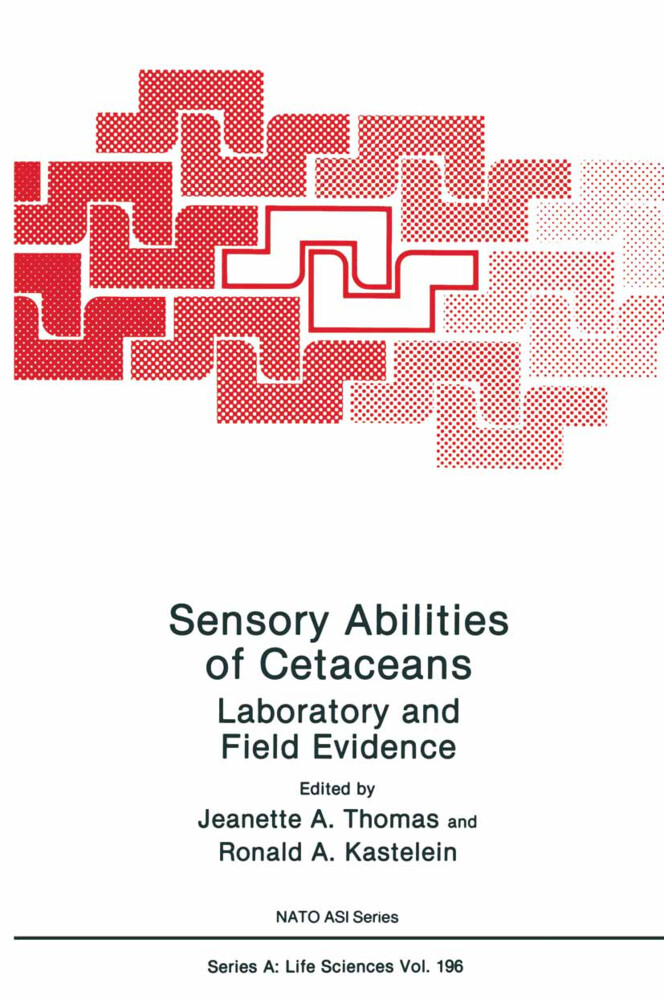
Zustellung: Mi, 08.01. - Sa, 11.01.25
Versand in 1-2 Wochen
VersandkostenfreiBestellen & in Filiale abholen:
This book evolved through the efforts of several organizations and the dedication of many individuals. In 1987, we received arequest to propose a workshop topic for the Fifth International Theriological Congress (ITC) to be held in August 1989 in Rome, Italy. After looking up the meaning of the word "theriological" in the dictionary and discovering that it pertains to mammalian behavior, we decided a symposium on sensory abilities of whales and dOlphins would be an interesting topic. The ITC convenes only every five years and has the distinction of being very weIl attended by scientists from around the world. We thought that hosting a workshop in conjunction with the ITC would attract a variety of international scientists that rarely have the opportunity to interact. Fortunately for all involved, our prediction was correct. The first two days of the workshop, 23-24 August 1989, were held in conjunction with ITC and the nearly 1,000 attending scientists were able to view our posters and listen to lectures. The third day was limited to only ab out 65 invited scientists who were divided into topical working groups chaired by a rapporteur.
Inhaltsverzeichnis
Sensory Anatomy and Physiology.- Forehead Anatomy of Phocoena Phocoena and Cephalorhynchus Commersonii: 3-Dimensional Computer Reconstructions with Emphasis on the Nasal Diverticula.- Structure and Thalamocortical Relations of the Cetacean Sensory Cortex: Histological, Tracer and Immunocytochemical Studies.- A Potential Neural Substrate for Geomagnetic Sensibility in Cetaceans.- Immunocytochemistry of Neurotransmitters in Visual Neocortex of Several Toothed Whales: Light and Electron Microscopic Study.- Evolution of the Nasal Anatomy of Cetaceans.- Three-Dimensional Reconstructions of the Dolphin EAR.- Sensory Neocortex in Dolphin Brain.- Evolutionary Morphology and Acoustics in the Dolphin Skull.- Tactile Sensitivity, Somatosensory Responses, Skin Vibrations, and the Skin Surface Ridges of the Bottle-Nose Dolphin, Tursiops Truncatus.- A Potential System of Delay-Lines in the Dolphin Auditory Brainstem.- Concluding Comments on Sensory Anatomy and Physiology.- Acoustic Senses.- Target Detection in Noise by Echolocating Dolphins.- Preliminary Notes on Behaviour of a Blindfolded Free-Swimming Dolphin Performing a Target Echolocation Task in a Pool.- On the Two Auditory Subsystems in Dolphins.- A Proposed Echolocation Receptor for the Bottlenose Dolphin (Tursiops mincatus): Modelling the Receive Directivity from Tooth and Lower Jaw Geometry.- Studies on Echolocation of Porpoises Taken in Salmon Gillnet Fisheries.- Very-High-Frequency Acoustic Emissions from the White-Beaked Dolphin (Lagenorhynchus Albirostris).- High Intensity Narwhal Clicks.- Investigations on the Control of Echolocation Pulses in the Dolphin (Tursiops Truncatus).- Purposeful Changes in the Structure of Echolocation Pulses in Tursiops Truncatus.- Echolocation Characteristics and Range Detection Threshold of a False Killer Whale (Pseudorca Crassidens).- Preliminary Hearing Study on Gray Whales (Eschrichtius Robustus) in the Field.- Inferences about Perception in Large Cetaceans, Especially Humpback Whales, from Incidental Catches in Fixed Fishing Gear, Enhancement of Nets by Alarm Devices, and the Acoustics of Fishing Gear.- Formation of an Adaptive Structure of the Peripheral Part of the Auditory Analyzer in Aquatic, Echo-Locating Mammals During Ontogenesis.- Frequency-Selectivity of the Auditory System in the Bottlenose Dolphin, Tursiops Truncatus.- Masked Hearing Abilities in a False Killer Whale (Pseudorca Crassidens).- Electrophysiological Studies of Hearing in Some Cetaceans and A Manatee.- Localization of the Acoustic Window at the Dolphin s Head.- Concluding Comments on Cetacean Hearing and Echolocation.- Chemical/Tactile/Visual Senses.- Preliminary Results from Psychophysical Studies on the Tactile Sensitivity in Marine Mammals.- Taste Reception in the Pacific Bottlenose Dolphin (Tursiops Truncatus Gilli) and the California Sea Lion (Zalophus Californianus).- Cognitive Performance of Dolphins in Visually-Guided Tasks.- Anatomical and Histological Characteristics of the Eyes of a Month-Old and an Adult Harbor Porpoise (Phocoena Phocoena).- Chemical Sense of Dolphins: Quasi-Olfaction.- Best Vision Zones in the Retinae of Some Cetaceans.- Visual Ecology and Cognition in Cetaceans.- Non-Acoustic Communication in Small Cetaceans: Glance, Touch, Position, Gesture, and Bubbles.- Visual Displays for Communication in Cetaceans.- Concluding Comments on Vision, Tactition, and Chemoreception.- Communication.- Acoustic Behavior of Mysticete Whales.- Acoustic Behavior in a Local Population of Bottlenose Dolphins.- Organization of Communication System in TursiopsTruncatus Montagu.- Signalization of the Bottlenose Dolphin During the Adaptation to Different Stressors.- Concluding Comments on Acoustic Communication.- Other Senses.- Geomagnetic Sensitivity in Cetaceans: An Update With Live Stranding Records in the United States.- Geomagnetic Orientation in Cetaceans: Behavioural Evidence.- Attention and Decision-Making in Echolocation Matching-to-Sample by a Bottlenose Dolphin (Tursiops Truncatus): The Microstructure of Decision-Making.- Stimulus Equivalence and Cross-Modal Perception: A Testable Model for Demonstrating Symbolic Representations in Bottlenose Dolphins.- The Ability of Bottlenose Dolphins, Tursiops Truncatus, to Report Arbitrary Information.- Concluding Comments on Other Sensory Abilities.
Produktdetails
Erscheinungsdatum
31. Januar 1991
Sprache
englisch
Auflage
1990
Seitenanzahl
732
Reihe
NATO Science Series A:
Herausgegeben von
Ronald A. Kastelein, Jeanette A. Thomas
Verlag/Hersteller
Produktart
gebunden
Abbildungen
XIII, 710 p.
Gewicht
1250 g
Größe (L/B/H)
241/160/44 mm
Sonstiges
HC runder Rücken kaschiert
ISBN
9780306436956
Entdecken Sie mehr
Bewertungen
0 Bewertungen
Es wurden noch keine Bewertungen abgegeben. Schreiben Sie die erste Bewertung zu "Sensory Abilities of Cetaceans" und helfen Sie damit anderen bei der Kaufentscheidung.









